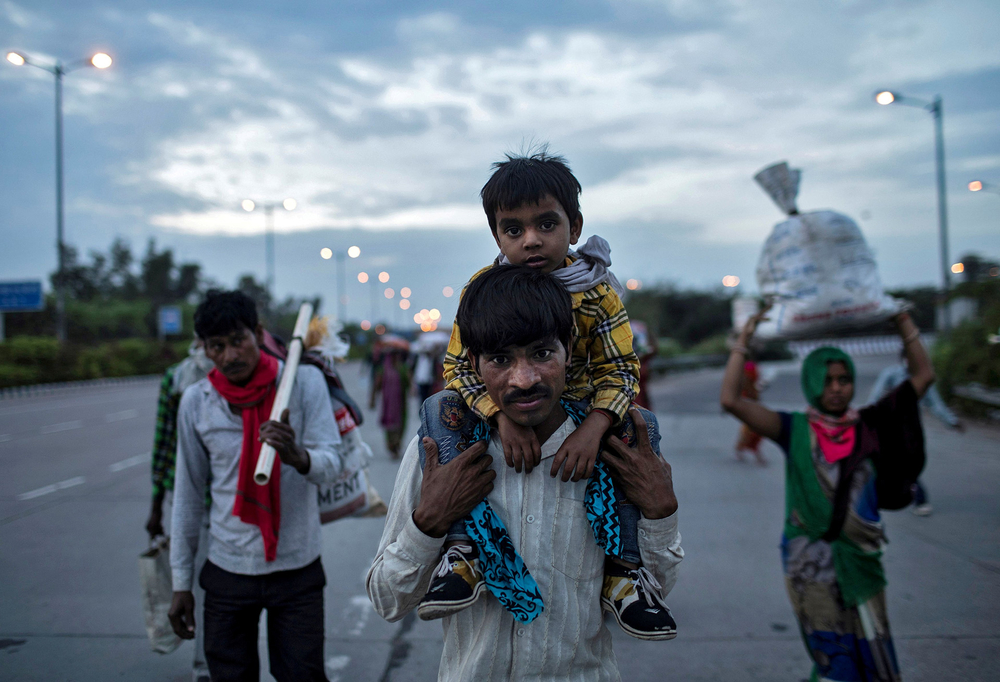CORONAVIRUS: Response and Cultural Impact
Coronavirus and Class Divide
On Tuesday, March 24, 2020 Prime Minister Narendra Modi announced a 21-day nationwide lockdown, starting from 12:01am on March 25, to prevent the spread of novel Coronavirus. This made India the 22nd country to announce a centralised lockdown. Following the video address, Ministry of Home Affairs issued guidelines which included a list of essential services not to be suspended in the period.
However, as a major blindspot, the guidelines did not have anything comprehensive to ease the anxiety faced by India’s 45 million migrant workers who had witnessed a steep decline in income as public life came to a halt over panic and now will have the limited income slashed due to the lockdown. What followed was mass migration of these daily wage earners back to their villages, covering hundreds of kilometers on foot. Defying government guidelines and risking arrest, workers argued that without any income, survival in cities is impossible. Interviewing one such worker waiting near Anand Vihar ISBT on March 24, NDTV’s Mukesh Sengar’s report shows him breaking down for not being able to get any bus service for three days while police officers patrolled streets, manhandling him and others found outside. When social distancing is the need of the hour, hundreds of workers walking back in groups or travelling in crowded vehicles increases the risk of spreading the virus exponentially, as health experts already predict stage three of the virus around the corner.
However, it is important to understand that this mass movement comes as a result of lack of agency with daily workers to protect themselves against starvation and homelessness. Unfortunately, popular sentiment does not share this empathy and is a broad mirror to the class-divide India still struggles with. Journalist and Rajya Sabha member Balbir Punj shared his opinion on Twitter, calling the migration rresponsible, adding, “It’s to utilize their paid chutti (vacation) to catch up with their families and run errands back home.” AltNews founder Prateek Sinha also noted that an appeal for policemen to behave humanely had elicited many jeering comments that they were actually being too humane.
What’s interesting to note here is that not too long ago, we had students and professionals stranded in remote parts of the world flown back by the government and kept in isolation, rather commendable work by airport security staff and health agencies. While magnitude is a factor to be considered, one cannot look over the lack of dignified treatment shown towards one of the biggest economic factions of the country.
In Uttar Pradesh, around 5,000 of these workers were sprayed with bleach, otherwise used to disinfect buses. Sometimes poetry can be cruel. As central and state governments are responding to the crisis, it comes at least 5 days and hundreds of kilometers after the initial hysteria. Caught in the frenzy of not being included in emergency plans, lack of agency and antagonistic public opinion, the most vulnerable section of India was let down by us, again. Even as this comes late, hopefully providing help and not exclusion will help us together to fight this global pandemic. Meanwhile, there are multiple charities working to provide food and shelter to those at high risk.
About Racism
The coronavirus pandemic has led to another unexpected set of problems, a prominent one being racism. Recently, a 25-year old Manipuri woman was spat paan on and called “corona” near Vijay Nagar in North Delhi. This was one of several racially motivated incidents, where an innocent person has been harassed after the outbreak of Coronavirus. This adds to the many accounts of racism and xenophobia reported across the world.
In the United States, President, Donald Trump has referred to Coronavirus as the Chinese-virus repeatedly, which has fueled the already prevailing racism against Asian Americans in the country. Some people believe that it is not wrong to call a virus by the name of the place it originated from as China deflects blame. What they fail to understand is the term effects the wrong communities. There are ways to hold China accountable without side-lining an entire race and spreading hatred towards the people of Chinese descent.
It seems like the hysteria comes as a result of repressed racism and people’s inability to differentiate race from nationality. This comes at a time when humanity needs to unite to fight against a common enemy and gerrymandering for political advantage will help no one.
Will we be able to afford food?
When the lockdown was announced on March 25, the Central Government asked citizens not to panic and reassured them that essential services such as groceries and medicines would still be available. However, multiple reports of people hoarding up on supplies continue to emerge, which raises the question of whether India’s food supply is sufficient to meet demand during this unprecedented lockdown.
From the perspective of preparation, things seem to be up to the mark. Against the requirement of 214 lakh tonnes of wheat and rice at the beginning of the year on January 1, 2020, the Food Corporation of India (FCI) had 565.11 lakh tonnes, which means roughly two-and-a-half times more than the essential requirement In addition, India already has a buffer stock of 30 lakh tonnes of sugar, which the government is planning to raise to 40 lakh tonnes this fiscal year and has been trying since December to offload 8.47 lakh tonnes from its buffer stock of pulses. The government is using the Public Distribution System to ensure direct cash transfers and food grains. However, nearly 85 percent of India’s population works in the informal sector and migrants, in particular, do not have access to these resources, due to which mass migration has occurred over the past week causing further risk of the virus spreading.
Moreover, the prices seem to have risen. According to reports by India Today, in the national capital, prices have gone up by 10% to 20% according to estimates. Amit Jain, a wholesale shopkeeper in Lahori Gate, was among the few who are still operating their businesses. “Prices of pulses have gone up by Rs 10 to Rs 20 per kg. Retailers add a margin of Rs 20 to Rs 30 per kg and it results in common people buying at much higher prices,” he said. It remains to be seen what the trend will be and how the government will
provide supply of commodities, in case of an extended lockdown.
Afterthought: What about the Economy?
Declaration of the pandemic has led to a global lockdown which has hampered growth rate by impacting jobs and thus, business. Guidelines like ‘work from home’ are not suitable for every industry, especially underpaid, unskilled and informal industry leaving a huge chunk of population vulnerable.
In the US, CNN reported recently that “more than half of American jobs are at risk because of coronavirus primarily in areas like retail, manufacturing, construction and education.” Since China makes up one third of the manufacturing sector globally, a complete halt in the operation of factories and a virus induced trust-deficit in Chinese products have majorly affected exports worldwide.
Meanwhile, The rupee has plunged against the US dollar and the Sensex has crashed by 30% in the month of March. The sensex suffered it’s biggest loss since 2008 owing to investor skepticism and turmoil in the oil market as tensions fuel after Saudi Arabia’s price war. The USA has been worst affected by the pandemic with the greatest number of to tal positive cases. With the world’s largest economy shrinking at the fastest rate since 1946, the global economy stands at the brink of collapse with soaring unemployment overburdening government resources. Mr. Trump’s response to it has been careless, if not criminal.
Downplaying the threat and being in denial has only worsened it further. India saw mass migration of unskilled and daily wage labourers to their hometowns, threatening the risk of further spread. Not all lockdown hit businesses can shift online in a country with limited internet penetration. Furthermore, real estate, aviation and hospitality sectors are hard hit due to the lockdown and the government hasn’t come up with sector specific action plans. Hopefully, we will survive this pandemic, but what is to follow is equally grave.




Comments